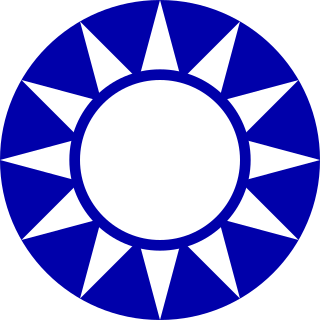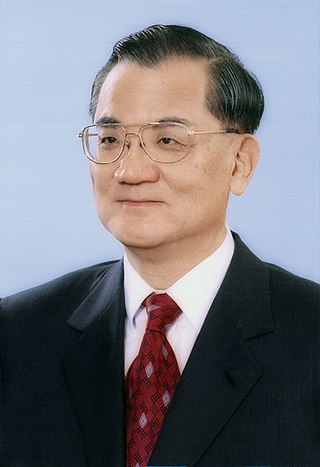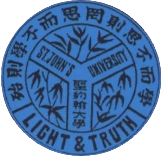
Chiang Kai-shek was a Chinese politician, revolutionary, and military leader who served as the leader of the Republic of China (ROC) and the Generalissimo of the National Revolutionary Army. He held these positions in mainland China from 1928 until 1949, when his nationalist Kuomintang (KMT) party was defeated in the Chinese Civil War by the Chinese Communist Party (CCP)—thereafter, he led the remnant of the ROC government on the island of Taiwan until his death.

The Kuomintang (KMT), also referred to as the Guomindang (GMD), the Nationalist Party of China (NPC) or the Chinese Nationalist Party (CNP), is a major political party in the Republic of China, initially based on the Chinese mainland and then in Taiwan since 1949. It was the sole ruling party in China during the Republican Era from 1928 to 1949, when most of the Chinese mainland was under its control. The party retreated from the mainland to Taiwan on 7 December 1949, following its defeat in the Chinese Civil War. Chiang Kai-shek declared martial law and retained his authoritarian rule over Taiwan under the Dang Guo system until democratic reforms were enacted in the 1980s and full democratization in the 1990s. In Taiwanese politics today, the KMT is a centre-right to right-wing party and is the largest party in the Pan-Blue Coalition. The KMT's primary rival in elections is the Democratic Progressive Party (DPP) and its allies in the Pan-Green Coalition. As of 2023, the KMT is the largest opposition party in the Legislative Yuan. The current chairman is Eric Chu.

Lien Chan is a Taiwanese politician. He was the Chairman of the Taiwan Provincial Government from 1990 to 1993, Premier of the Republic of China from 1993 to 1997, Vice President of the Republic of China from 1996 to 2000, and was the Chairman of the Kuomintang (KMT) from 2000 to 2005, apart from various ministerial posts he had also held. Lien ran for the President of the Republic of China on behalf of the Kuomintang twice in 2000 and 2004, but both lost to Chen Shui-bian of the Democratic Progressive Party. Upon his retirement as KMT Chairman in August 2005, he was given the title Honorary Chairman of KMT. He is highly credited after holding a groundbreaking visit to Mainland China in his capacity as the Chairman of the Kuomintang to meet with the General Secretary of the Chinese Communist Party Hu Jintao on 29 April 2005, the first meeting between the two party leaders after the end of Chinese Civil War in 1949, which subsequently helped thaw the long-stalled cross-strait relations.

Koo Chen-fu, also known as C.F. Koo, was a Taiwanese businessman, diplomat, and film producer. He led the Koos Group of companies from 1940 until his death. As a chairman of the Straits Exchange Foundation (SEF), Koo arranged the first direct talks between Taiwan and mainland China since 1949 and served as Taiwan's negotiator in both the 1993 and 1998 Wang-Koo summit.
The 1992 Consensus is a political term referring to the alleged outcome of a meeting in 1992 between the semiofficial representatives of the Chinese Communist Party (CCP)-led People's Republic of China (PRC) of mainland China, and the Kuomintang (KMT)-led Republic of China (ROC) of Taiwan. They are often credited as creating a diplomatic basis for semi-official cross-strait exchanges which began in the early 1990s and is a precondition set by the PRC for engaging in cross-strait dialogue.

The 2005 Pan–Blue visits to mainland China were a series of groundbreaking visits by delegations of the Kuomintang (KMT) and their allied Pan-Blue Coalition to mainland China. They were hailed as the highest level of exchange between the Chinese Communist Party and the Kuomintang since Chiang Kai-shek and Mao Zedong met in Chongqing, China on August 28, 1945.

Cross-Strait relations are the relations between China and Taiwan.

Sun Chuanfang was a Chinese warlord in the Zhili clique and protégé of the "Jade Marshal" Wu Peifu.

St. John's University (SJU) was a Christian university in Shanghai. It was founded in 1879 by American missionaries.

The Canton Coup of 20 March 1926, also known as the Zhongshan Incident or the March 20th Incident, was a purge of Communist elements of the Nationalist army in Guangzhou undertaken by Chiang Kai-shek. The incident solidified Chiang's power immediately before the successful Northern Expedition, turning him into the paramount leader of the country.
Events in the year 2009 in China.
Events from the year 1958 in Taiwan, Republic of China. This year is numbered Minguo 47 according to the official Republic of China calendar.
Events in the year 2011 in China.
Events in the year 1946 in the Republic of China. This year is numbered Minguo 35 according to the official Republic of China calendar.
This is a list of events in the year 1947 in the Republic of China. This year is numbered Minguo 36 according to the official Republic of China calendar.
Events from the year 1930 in China.

Hu Lanqi, also spelled Hu Lanxi, was a Chinese writer and military leader. She joined the National Revolutionary Army in 1927 and the Chinese branch of the Communist Party of Germany in 1930. She was imprisoned by Nazi Germany in 1933 and wrote an influential memoir of her experience, for which she was invited by Maxim Gorky to meet him in Moscow. After the outbreak of the Second Sino-Japanese War in 1937, she organized a team of women soldiers to resist the Japanese invasion, and became the first woman to be awarded the rank of Major General by the Republic of China. She supported the Communists during the Chinese Civil War, but was persecuted in Mao Zedong's political campaigns following the Communist victory in Mainland China. She survived the Cultural Revolution to see her political rehabilitation, and published a detailed memoir of her life in the 1980s.
Events from the year 1981 in China.

Oei Hui-lan, known as Madame Wellington Koo, was a Chinese-Indonesian international socialite and style icon, and, from late 1926 until 1927, the First Lady of the Republic of China. She was married firstly to British consular agent Beauchamp Caulfield-Stoker, then to the pre-communist Chinese statesman Wellington Koo, and was a daughter and heiress of the colonial Indonesian tycoon Oei Tiong Ham, Majoor der Chinezen.












